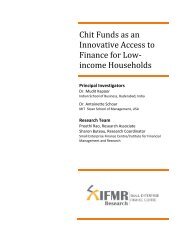Government of India Volume I: Analysis and Recommendations
Government of India Volume I: Analysis and Recommendations
Government of India Volume I: Analysis and Recommendations
Create successful ePaper yourself
Turn your PDF publications into a flip-book with our unique Google optimized e-Paper software.
CONSUMER PROTECTION<br />
using or disclosing any personal information belonging to consumers, except to the extent required<br />
for the purposes <strong>of</strong> carrying out their business or expressly permitted under the draft Code.<br />
The draft Code also provides safeguards for consumers to be able to access their personal information<br />
held by service providers <strong>and</strong> ensure that the information is accurate <strong>and</strong> complete (see<br />
Table 5.7).<br />
5. Requirement <strong>of</strong> fair disclosure<br />
Information asymmetry between consumers <strong>and</strong> financial firms affects the quality <strong>of</strong> financial<br />
decisions made by consumers. This asymmetry needs to be addressed by imposing a positive<br />
obligation on financial service providers to provide consumers with all the information that is<br />
relevant for them to make informed decisions. This includes disclosures required to be made<br />
prior to entering a financial contract <strong>and</strong> continuing disclosures regarding material changes to<br />
previously provided information or the status or performance <strong>of</strong> a financial product.<br />
Given the wide array <strong>of</strong> financial services being covered under the draft Code, the regulator may<br />
find it useful to specify different disclosure requirements for various financial products <strong>and</strong> services.<br />
With this objective, the draft Code empowers the regulator to make differing provisions<br />
regarding the types <strong>of</strong> information required to be disclosed, the manner in which disclosures<br />
must be made <strong>and</strong> the appropriate time-periods for making required disclosures.<br />
6. Redress <strong>of</strong> complaints<br />
The Commission envisages a two-tier approach for the redress <strong>of</strong> consumer complaints: first at<br />
the level <strong>of</strong> the financial service provider <strong>and</strong> subsequently at the level <strong>of</strong> the redress agency (for<br />
retail consumers).<br />
If a consumer is dissatisfied with a financial product or service, the consumer should first take up<br />
the issue with the relevant financial service provider. For this purpose, the draft Code requires all<br />
financial service providers to have in place an effective mechanism to redress complaints from<br />
consumers. They will also be obliged to inform consumers about their right to seek redress <strong>and</strong><br />
the process to be followed for it. The regulator may supplement these requirements by laying<br />
down specific details <strong>of</strong> the process to be followed by financial service providers to receive <strong>and</strong><br />
redress complaints.<br />
In certain cases the regulator may also envisage an additional layer <strong>of</strong> grievance assessment to<br />
take place after, or instead <strong>of</strong>, the service provider’s own grievance redress mechanism <strong>and</strong> before<br />
the complaint goes to the redress agency. The stock exchange arbitration process would be an<br />
example <strong>of</strong> such an arrangement.<br />
5.5. Additional protections for retail consumers<br />
The Commission believes that the following rights <strong>and</strong> protections should be available to<br />
retail consumers over <strong>and</strong> above the protections available to consumers generally. These<br />
protections are needed due to the generally low levels <strong>of</strong> knowledge <strong>and</strong> experience <strong>of</strong><br />
retail consumers.<br />
1. Assessment <strong>of</strong> suitability<br />
Retail consumers may <strong>of</strong>ten be in a situation where they are not able to fully appreciate the features<br />
or implications <strong>of</strong> a financial product, even with full disclosure <strong>of</strong> information to them. This<br />
makes a strong case for a thorough suitability assessment <strong>of</strong> the products being sold to them.<br />
The draft Code provides this protection by requiring that any person who advises a retail consumer<br />
in relation to the purchase <strong>of</strong> a financial product or service must obtain relevant information<br />
about the needs <strong>and</strong> circumstances <strong>of</strong> the consumer before making a recommendation to<br />
the consumer (see Table 5.8).<br />
2. Dealing with conflict <strong>of</strong> interests<br />
One <strong>of</strong> the best ways to ensure good consumer protection is to align the incentives <strong>of</strong> financial<br />
service providers with those <strong>of</strong> consumers <strong>and</strong> ensure that in case <strong>of</strong> a conflict, the interests <strong>of</strong><br />
consumers take precedence. The draft Code incorporates this principle <strong>of</strong> prioritising the interests<br />
<strong>of</strong> retail consumers over those <strong>of</strong> the provider. It also requires advisors to inform retail consumers<br />
about any conflicted remuneration they st<strong>and</strong> to receive, which may influence the advice<br />
being given to the retail consumer. The regulator may, in addition, specify the nature, type <strong>and</strong><br />
48 FINANCIAL SECTOR LEGISLATIVE REFORMS COMMISSION



